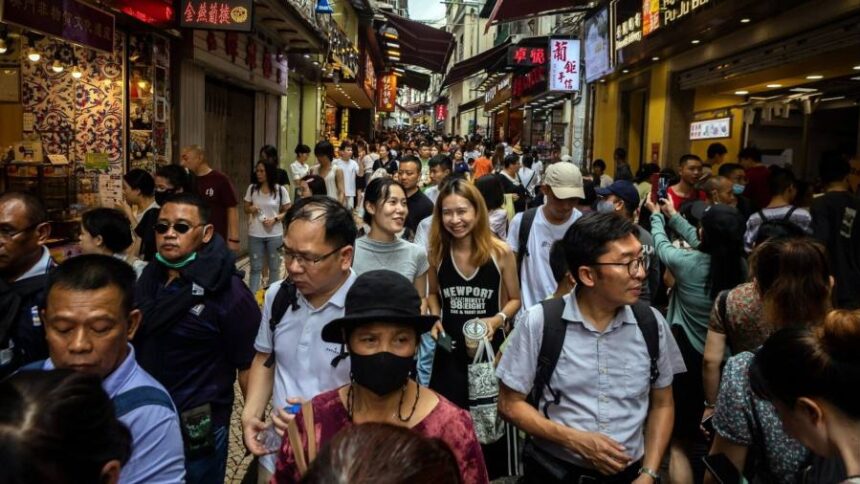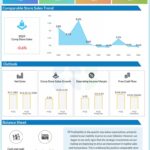Receive free Chinese economy updates
We’ll send you a myFT Daily Digest email rounding up the latest Chinese economy news every morning.
The writer is chief executive of Gavekal, a Hong Kong-based financial services company
Property prices are falling. Large developers have fallen into dire straits. A big financial conglomerate has missed interest payments on products sold to investors. For many, such recent events in the country feel like the remake of a 2008 film few enjoyed.
The gloomiest foretell the unfolding implosion of the Chinese economy with years of over-building, white elephant projects and unproductive infrastructure spending finally coming home to roost.
Given that a systemic crisis in China would reverberate around the world, this has raised alarm and triggered calls for Beijing to intervene more forcefully to revive the Chinese economy. The curious thing, though, is that such doom and gloom is not reflected in what the market is signalling.
Let me start with the performance of banks. In most financial crises, the share price performance of banks starts signalling trouble months before a systemic crisis unfolds.
For example, the S&P Composite 1500 Bank index fell 66 per cent between January 2007 and July 15 2008 before Lehman Brothers collapsed in September that year. Similarly, European banks, as measured by the MSCI EMU bank index, shed 35.4 per cent between January 1 2010 and August 1 2011 — before sovereign bond yields on the eurozone’s periphery started to blow out, unleashing the euro crisis.

With this in mind, over the past 12 months, Chinese bank shares (as measured by the FTSE China A-Share bank index) have actually gained 2.4 per cent (without accounting for dividends). This means over that period, Chinese banks have actually outperformed US banks by 12.6 per cent in dollar terms. So what does one call an emerging-market systemic financial crisis in which local banks are up on the year and outperforming US banks by double digits? There are really only two possible answers: unprecedented or non-existent.
Here is something else unprecedented in an emerging-market financial crisis: the massive outperformance of Chinese government bonds relative to US Treasuries, considered a traditional haven investment.
Up until the Covid-19 lockdowns, the returns on Chinese government bonds and US Treasuries were roughly the same on any meaningful timeframe. But Covid obviously saw very different policy choices implemented in China (longer lockdowns) and the US (extreme fiscal stimulus and central bank balance sheet expansion).
Consequently, since January 1 2020, long-dated Chinese government bonds (as measured by the BAML indices) have returned 17.1 per cent, while long-dated US Treasuries have delivered returns of negative 13.4 per cent. Bringing us back to our question above, what does one call an emerging-market systemic financial crisis in which local government bonds outperform US Treasuries by more than 30 percentage points in less than three years? Unprecedented or non-existent.

Of course, one may elect to dismiss the messages coming out of the Chinese equity markets (which, although disappointing this year, have yet to take out their October 31 2022 lows), the government bond moves or even the foreign exchange shifts as the hand of Beijing on prices could easily skew signals.
But looking further afield from China, we still have commodity prices grinding higher. For example, iron-ore, possibly the most China-sensitive of all commodities, is up 50 per cent from its October 31 2022 low and has actually been rising over the past few weeks even as the negativity on the Chinese economy has amplified.

The past year has also seen the share prices of China-sensitive western companies such as LVMH, Hermès, Ferrari and others do particularly well. In fact, most luxury goods producers are trading at, or close to, all-time highs. This would seem counterintuitive if China really were facing a systemic meltdown.
The rampant negativity also overlooks some important bright spots in the Chinese economy. For example, Macau tourist arrivals have lately soared back to normal levels, and this in spite of severe staff shortages across all the major casinos. Domestic tourism is broadly picking up. Car sales in China are still up this year despite a small decline in June and July. Alibaba just reported a return to strong sales growth in its second-quarter results. Yet more signs of an economy that is not imploding.
That is not to deny that China’s economy faces genuine challenges or that Chinese economic growth is slowing, cyclically and structurally. But in short, there seems to be a strong disconnect between the price behaviour of most China-related assets, whether at home or abroad, and fears of an unfolding systemic crisis.








